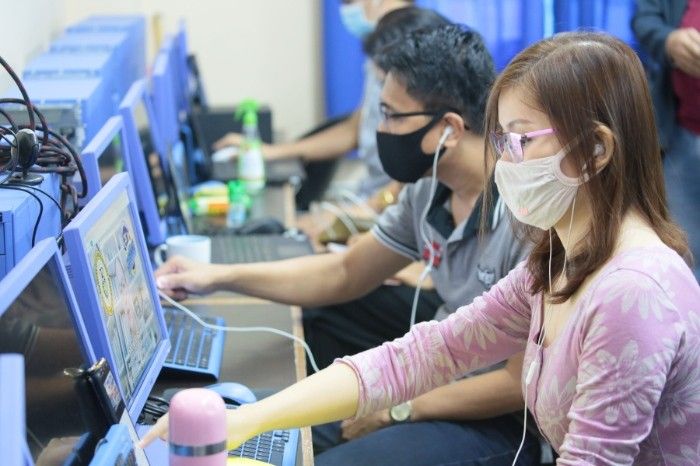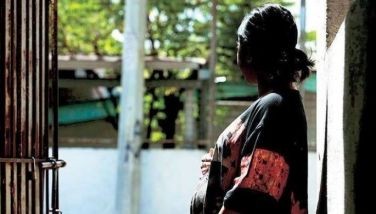P389-M Manila Bay 'white sand' budget could have been used for distance learning — DepEd

MANILA, Philippines — The Department of Education on Monday said the P389-million budget for the widely-criticized makeover project on the Manila Baywalk could have been used to fund distance learning needs amid the pandemic.
DepEd Secretary Leonor Briones said this during a virtual Laging Handa briefing after the issue was raised by the media.
"We are not interfering with the budget of others but if we had [the P389 million] budget, I'm sure we would have used it for gadgets, computers, and radios [for distance learning]," Briones said in Filipino.
The Department of Environment and Natural Resources last Thursday confirmed that piles of crushed dolomite were being dumped along the shore of Manila Bay to transform the area—known for its stunning sunset views and garbage-strewn, murky waters—into something similar to popular tourist destination Boracay.
But the move to fill the 500-meter stretch with white sand—actually crushed dolomite boulders, according to DENR —did not sit well with environmental groups, who said the dumping could cause more harm to Manila Bay.
READ: 'White-sanding' along Manila Bay will not make it cleaner, DENR reminded | No environmental impact study needed on Manila 'beach nourishment' — DENR
A notice of award issued by the Department of Public Works and Highways on Dec. 27, 2019 showed that P389.8 million was awarded to MAC Builders/Dragonhart Construction Enterprise Inc for the “beach nourishment, coastal restoration and enhancement of Manila Baywalk Area.”
When pressed on how DepEd might have used this budget instead, Briones pointed out several gaps in connectivity across the country which need to be addressed even as classes are set to open in less than a month.
RELATED: Aetas displaced by Taal eruption to continue lessons through hand-delivered modules
Last Mile Schools
"If, for example, we had P389 million given to the department by the government, I'm sure a big part of that would have gone to the need for gadgets in several areas. Because we have more than 3,000 schools which we call 'Last Mile Schools' that don't have connectivity [and] are quite isolated, so [the funds] would have helped," the education secretary said in Filipino.
DepEd last year unveiled the Last Mile Schools Program which "aims to address the gaps in resources and facilities of schools that are located in geographically isolated and disadvantaged and conflict-affected areas (GIDCA)."
A press release from the department dated July 22, 2019, further defines last mile schools as "those with less than four classrooms, usually makeshift and nonstandard ones; no electricity; no funds for repairs or new construction projects in the last four years; and a travel distance of more than one hour away from the center, accessible only through difficult terrain."
"Likewise, these are schools with multi-grade classes, with less than five teachers, and a population of less than 100 learners, more than 75% of whom are indigenous peoples (IP)," DepEd added.
As of July 2019, the department identified around 7,144 schools nationwide in need of immediate support.
'P389-M could have been used for gadgets, printed modules'
"Another thing is the printing of modules, because there are areas, as I said, here in the Philippines, even urban centers, that don't have access to technology...and the sources of our connectivity still need to be secured," Briones said in Filipino.
She added that there are still parents and learners who still want hard copies of their modules so a bigger budget could helped cater to these concerns.
In addition to this, Briones said the department would have wanted the radios used for distance learning to be waterproof to attain a "certain level capacity and reach."
Despite all these concerns and the quickly approaching opening of schools amid the pandemic, the education secretary reiterated that her department would make do with whatever has been allocated by the president and the Department of Budget and Management.
DBM denies DepEd request for more funding
The proposed national budget submitted to Congress by DMB shows that President Rodrigo Duterte is seeking a combined P20-billion increase in funds for the military and the national police in 2021.
The 2021 National Expenditure Program (NEP), a copy of which was obtained by The STAR from the House appropriations committee, increased the funding of the Armed Forces of the Philippines to P203 billion next year from P186 billion this year.
The NEP also set the Philippine National Police budget for 2021 at P190.85 billion or an increase of P3.25 billion from P187.6 billion this year.
Meanwhile, DBM denied the Department of Education P65-billion supplemental budget request for its learning continuity plan.
Education Undersecretary Anne Sevilla, during a virtual briefing, called the request a conservative amount, primarily meant to cover the provision of laptops to all public school teachers, as well as to fund the upholding of minimum health standards in basic education schools and offices. — with reports from Gaea Katreena Cabico
- Latest
- Trending





























